Ahoy, squirts! Quint here with the next installment of A Movie A Day.
[For those now joining us, A Movie A Day is my attempt at filling in gaps in my film knowledge. Every day Monday-Friday I’ll be reviewing a film I haven’t seen before. Each film will be connected in some way to the film before it, be it by actor, director, writer, etc. It’s a great time to be a film explorer, with TCM’s amazing programming, Netflix Watch Instant’s large library and studios starting up boutique burn-on-demand DVD services for their more obscure vault titles. So, I’m going exploring and I hope you guys will join me on my cinematic expedition.]
Today we’re following director Ronald Neame over from Hopscotch for his liberated school teacher drama The Prime of Miss Jean Brodie, but first let’s get into today’s Buster Keaton short: The Play House! You can follow along if you rent or buy the sweet Kino Buster Keaton Short Films Collection.
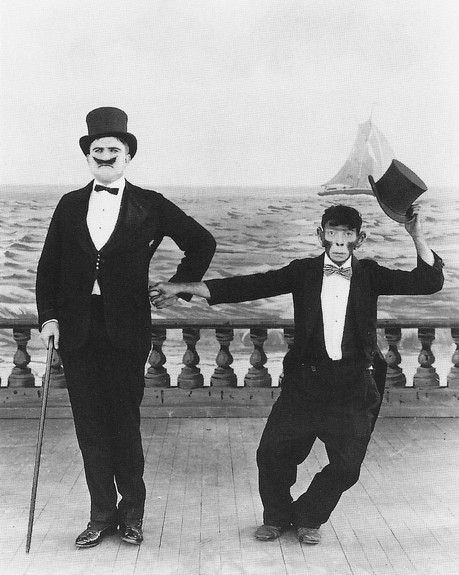
Alright, this is what I’m talking about. Easily my second favorite Keaton short (behind One Week). If One Week’s strength was in emphasizing Keaton’s physical comedy prowess with the massive stunts and set pieces of that crazily off-balance house, The Play House succeeds because it focuses on his wonderfully inventive sight gags.
The short opens with Keaton walking up to a theater, buying a ticket and stepping inside only to find that he is everyone in the theater. There isn’t a typo in that last sentence. This is some Being John Malkovich stuff. He is every dancer on the stage, he’s every member of the orchestra, including the conductor, and he’s also every member of the audience. Young or old, male or female, it’s all Buster Keaton.
The trick photography used to execute these shots is remarkable even by today’s standards. I couldn’t find the Patty Duke Show seams and I was looking.
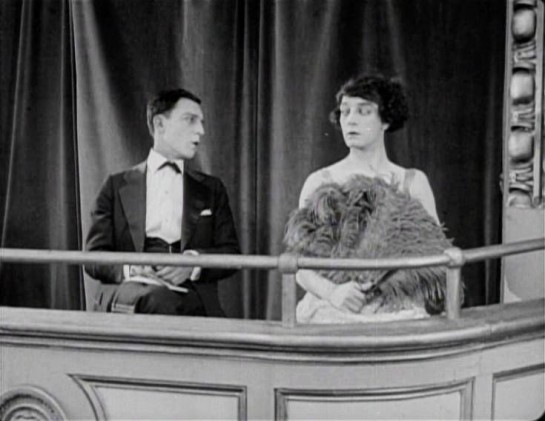
It was a wonder watching all his characters interacting… dancing with each other, playing music with each other, spilling things on each other. It’s pure movie magic stuff.
If the whole short had been this concept I would have been perfectly happy, but we realize it was all a dream of a prop master at the very same theater and the second half of the two-reeler has him as the props guy falling in love with the newest vaudeville star… who just happens to have an identical twin sister.
The duality shown in the dream sequence is mirrored (yuk-yuk-yuk) here as there are many comical mix-ups with the two sisters and Keaton thinking he’s drunk and seeing double.
To add to all this, Keaton loses one of the performer’s monkeys, so he has to make himself up as one and fill in, which is where that awesome first picture comes from.
One thing I want to bring up is a rather brilliant gag involving the audience. There are two old dudes, presumably Civil War vets, who each have lost an arm, so they sit next to each other during the final vaudeville show and clap each other’s hands. That’s when they both like something. If one of them doesn’t like an act then the other is totally left hanging. It’s a great gag and referred to at just the right times throughout the second half of the short.
I loved this one and will definitely revisit it many times. Yay for great Buster Keaton! This crazy funny short was a bit of an interesting lead in to today’s rather serious drama, I must say. Let’s talk about it, shall we?

The great Maggie Smith stars in The Prime of Miss Jean Brodie, a complex drama that you think is going to be a Dead Poets Society type movie about an inspirational teacher bucking a conservative religious school system, providing real life lessons and enlightenment to her pupils, but it ends up being something a bit more hard to define.
Miss Brodie teaches at a private Catholic school in 1930’s Scotland and her pupils have a reputation for being troublemakers after taking her class. Brodie’s Girls are free-spirited, have a love of the arts and always question authority.
Maggie Smith won the Oscar (and the BAFTA) for her portrayal of Jean Brodie and for good reason. She’s a fascinating character. At the beginning of the movie you’re rooting for her. She’s going against the system so she can give her girls a more worldly view of life. She’s fighting the good fight, disobeying the strict head of the school, Miss Mackay (Celia Johnson) and inspiring her students in the process.
But as the movie moves into the second and third acts it becomes more and more apparent that Jean Brodie isn’t as selfless as she thinks she is and she starts doing some really sketchy shit, maneuvering some of her girls into some really inappropriate positions.
This wild and free woman thinks she has everything under control. She’s in her prime, as she keeps repeating to her students, so naturally she has multiple lovers, but no commitment to any of them.
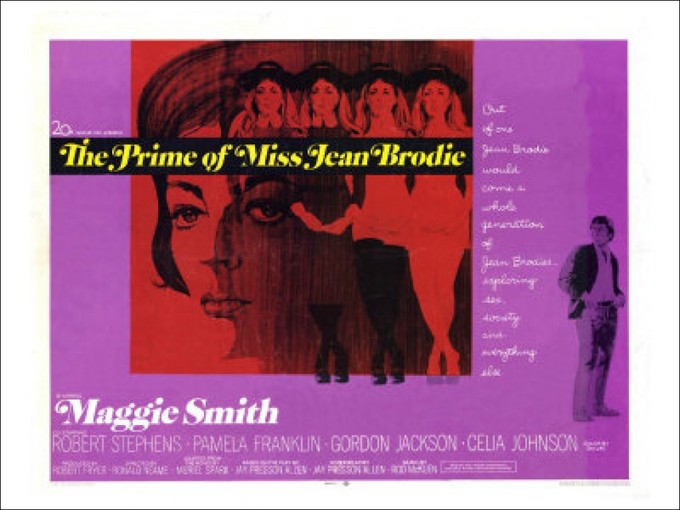
It’s not that she’s a bad example, really, but at a certain point in the second act she decides to position one of her students (who are all under 14 years old, by the way) into the crosshairs of her artist lover as a way to distract him from his infatuation with her. He has a family, but is obsessed with Jean Brodie, so she kind of grooms one of her girls that looks a little like her to become his next fling so she can deal with the emotions of the complicated situation.
And that’s not the worst of what she does, so it becomes an incredibly fascinating character study because for the first half of the movie Jean Brodie can do no wrong in the eyes of the audience. She’s progressive, letting her students pursue their budding passions in the arts and protecting them from the iron foot of the strict headmistress.
By the end of the movie you’re questioning whether any of her actions were legitimately for her students or for herself. She clearly likes having her students, a little army of schoolgirls who worship the ground she walks on. When you begin to question her perception of herself you then have to question everything we’ve seen. Has she always been that way or was there a subtle transition somewhere along the line?
Smith plays that ambiguity amazingly well. It’s not so much a showy performance as it is an assured one. We may not know the secrets to Miss Jean Brodie’s soul, but Dame Smith clearly does.
All of her “girls” we get to know are distinct personalities, from the sweet Mary McGregor (Jane Carr) to the pretty Jenny (Diane Grayson), but the standout is Pamela Franklin as Sandy. Ms. Franklin plays young so well that I felt instantly ashamed and uncomfortable when she poses nude for her lecherous art teacher, played by Robert Stephens. When the movie starts I could have sworn this book wormy girl with the Harry Potter glasses was all of 13 or 14 years old… I guess that’s why she’s cast.
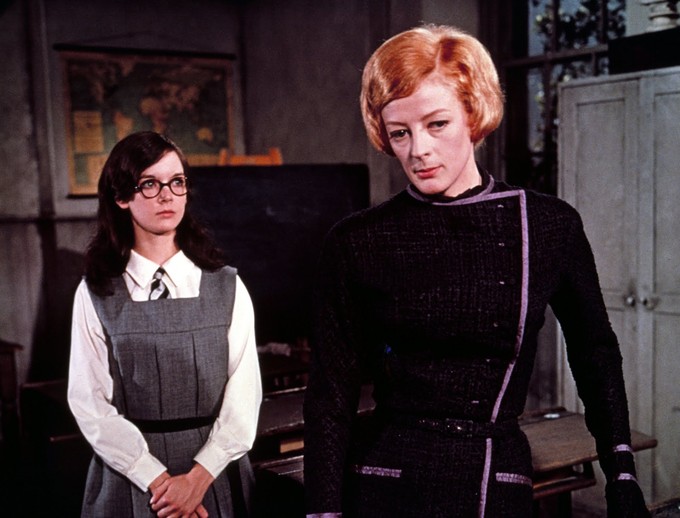
By the time she strips down her character is supposed to be a few years older, a senior, but still. That Neame made me all creepy-feeling, the bastard.
Franklin does a great job with this role, though. She’s the first to turn away from being a blind Brodie acolyte, something Miss Brodie herself should have foreseen. No matter what you think of Miss Brodie by the end of the movie her ability to spot a person’s strengths is evident. She always knew that Sandy was the smart one, she just didn’t figure how she’d use those smarts.
Sandy’s an interesting character in that she could have been played in a variety of different ways while still staying true to her arc. She could have been the betrayed innocent or the always cold and calculating and still start in the same place and end in the same place, but Franklin strikes the bullseye in-between those two paths.
By the way, just when I felt okay with myself for seeing Franklin naked I realized she was the little girl from The Innocents and went right back to feeling like I should go buy a windowless van and grow a mustache. Thanks, again Ronald.
Final Thoughts: A supremely acted drama that embraces the grey area of the human condition, which I could see being a turn off for some viewers, but those that let themselves go along for the ride will be rewarded with some truly great, subtle performances. One thing is for sure, you’ll never look at Professor McGonagall in the same way…
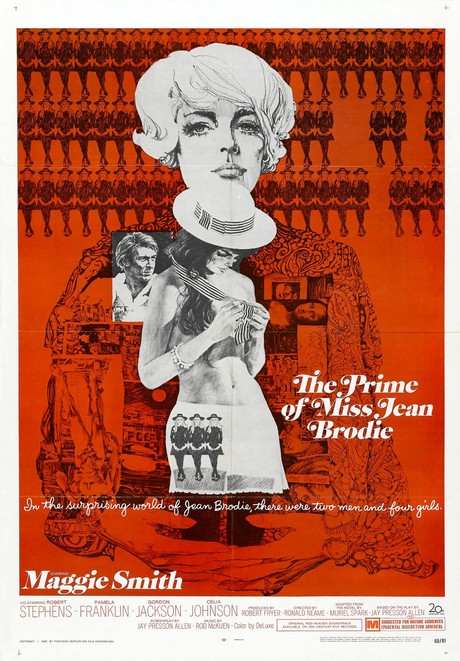
Upcoming A Movie A Day Titles:
TUNES OF GLORY (1960)

HITLER: THE LAST 10 DAYS (1973)

YOUNG WINSTON (1972)

A REFLECTION OF FEAR (1973)

SWASHBUCKLER (1976)

Yeah, that's right. We got a bunch of Robert Shaw coming up! I'm a little ashamed at not having seen Swashbuckler yet... it came out the year after Jaws and it's a Quint-led pirate movie co-starring James Earl Jones! But now we can watch it together (it's on Netflix so there's very little excuse)!
Tomorrow we follow Ronald Neame once more over to 1960’s Tunes of Glory, starring Alec Guinness! Our Buster Keaton short will be The Boat. See you then!
-Eric Vespe
”Quint”
quint@aintitcool.com
Follow Me On Twitter

Previous A Movie A Day (2013) Titles:
-The Ship That Died of Shame (1955)
